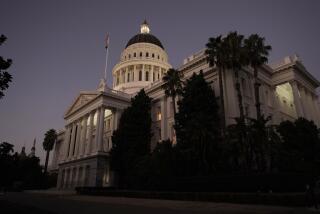1989 Legislative Session: The Final Hours : Bradley’s Traffic Plan Set Back by Bill’s Passage : TRUCKING
SACRAMENTO — Turning back an effort by the city of Los Angeles to kill the bill, bone-weary legislators succumbed to trucking interests Saturday and approved a measure that could impede Mayor Tom Bradley’s attempts to reduce traffic congestion.
The Senate voted 25 to 10 early in the morning to pass a bill that city officials believe casts a legal cloud over their intent to charge truckers a fee for using city streets. The legislation, which had already passed the Assembly, is expected to be signed into law by Gov. George Deukmejian.
So critical are the fees to a plan to reduce traffic congestion and air pollution in Los Angeles, said Bradley’s transportation coordinator, William Bicker, that the bill may force the city to seek other means to obtain the revenue from truckers. The fees would have paid for a program to manage truck traffic.
Possible Strategy
He said the city may have to team up with another governmental entity--possibly the South Coast Air Quality Management District--which has stronger legal standing to impose fees on truckers. In that case, Bicker said it would be more difficult for the city to live up to the promise officials made to the business community that the annual fees would not be higher than $60 per vehicle.
The fees were the keystone of Bradley’s plan to establish an innovative system for managing truck traffic that was expected to become a model for urban areas. By working with each industry individually, the plan called for the city to devise a strategy for getting at least 70% of the trucks off city streets during peak hours. The fees would cover the costs associated with the city’s effort to establish the operating hours for thousands of trucks.
Typical of the kind of accommodation the city hopes to reach with businesses and truckers, Bicker said, is a plan being worked on with some retailers whose supplies are shipped through Los Angeles Harbor. The city has offered to open harbor facilities in the evening and to cover the additional costs for one year to terminal operators of having their employees work abnormal hours, he said. The retailers in return are being asked to load their trucks and transport their goods at night.
“If you start out with the assumption that you have this huge street network that is not being used eight hours at night and is being overused in the day you want to find a way to spread the use out over 24 hours,” Bicker said.
“That way you can improve air quality, reduce congestion, cut down on accidents and have less need to build new roads.”
But officials of the powerful California Trucking Assn. have objected to the fees and the restrictions on time-of-day travel, saying they fear it might lead other cities to copy it. When legislators sought their support for an $18.5-billion transportation program, they agreed only if a bill was passed limiting the ability of local governments to manage truck traffic.
The bill touched off a battle between trucking interests and cities that forced lawmakers to decide between their loyalty to local officials and their desire to have the truckers back a transportation program that will require voters to endorse a 9-cent-per-gallon gasoline tax increase and substantial hikes in state truck-weight fees. When the bill finally emerged from the Legislature on Saturday, the truckers had won out.
Bradley won an early victory by persuading lawmakers to exempt Los Angeles from a requirement that local governments must adopt a congestion management plan before they can restrict truck traffic.
The truckers came back with an amendment approved on the Assembly floor that said nothing in the act could be construed as allowing local governments to impose fees “not otherwise authorized by law.” Since the law is silent on the subject of local truck fees, city officials said they feared the amendment would prompt an adverse ruling from the courts.
As the bill came before the Senate Transportation Committee on Friday night, the League of California Cities, the Sierra Club and officials from Los Angeles, San Diego and San Jose made a final assault, begging lawmakers to defeat the measure.
Sen. William Campbell (R-Hacienda Heights), the bill’s author, subtly reminded the committee of the need for trucker support in the tough campaign for passage of a ballot measure that would trigger the gas-tax increase.
“Quite candidly this legislation is very important to the truckers,” he said.
Through increased fees and the gas hike, he estimated that truckers would pay $4 billion of the $18.5 billion to be raised for the transportation-improvement program. “That’s a sizable hit,” he said. “That’s why they don’t want to be hit at the local level by all the cities in the state imposing these fees.”
The first vote was 7 to 4 in favor of the cities. Campbell asked for a recess. Two hours later the committee returned and reversed itself with Sens. Rose Ann Vuich (D-Dinuba), Cecil Green (D-Norwalk) and Rebecca Morgan (R-Los Altos Hills) switching their votes to side with the truckers.
More to Read
Sign up for Essential California
The most important California stories and recommendations in your inbox every morning.
You may occasionally receive promotional content from the Los Angeles Times.










